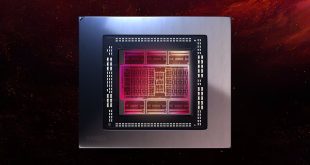The graphics card wars are heating up again folks, but not just with performance, with features too. Nvidia is gunning for its GSync technology which fixes screen tearing without the need for the performance drop associated with Vsync, but AMD has something potentially more exciting. AMD has Mantle, its DirectX replacement API that gives developers hard access to the GPU and potentially means much better performance on AMD hardware. This has all been theoretical until now, but today we get our first look at an in-engine bit of gameplay rendered in real time and the performance really is quite impressive.
Restart the clip if you want to watch the whole Oxide games preview, but for now it starts at the beginning of the demo: [yframe url='http://www.youtube.com/watch?v=QIWyf8Hyjbg#t=26m20s']
Once the demo gets going it looks very pretty, but nothing too special. When they zoom out however and you realise the engine is rendering thousands of little ships, alongside some large capital space craft all firing their own weaponry at a very high level of detail, it turns into something very impressive. On top of that, the frame rate is constantly well over 200 and this is all before any GPU optimisation. It's speculated that the scene should easily be able to handle 300 FPS after tweaking.
One large carrier has over 200 individual missile tubes which can target different enemies, leading to upwards of 25,000 individual objects in any one scene at one time. That's nothing though, after optimisations, the Oxide spokesperson reckons they can squeeze in 100,000 objects and make it playable on most AMD hardware.
The demo was run on an FX8350 and a “hawaii board,” so one of the new 290x boards.

That's a lot of stuff and as we all know, more stuff in a game is more gooder
As the developers go on, the difference between traditional direct3D rendering and Mantle rendering became obvious. Ultimately switching to the new method allowed the developers to effectively shut the CPU down between frames if it wanted because it just wasn't needed. Of course, in-fact it will end up doing something, but that could lead to even bigger performance gains.
Oxide broke down the performance improvements with Mantle as follows:
- API overhead reduced by 10x
- Mantle scales much better with CPU cores, leading to better multithreaded performance gains
- This means that true core chips like AMD's 8350 can compete with Intel's 4770k because the latter “only” uses virtual hyperthreaded cores
- Mantle makes the GPU so much more capable and able to shoulder the load, that even when underclocking the CPU to 2GHZ, the 290X being used was still the bottleneck
KitGuru Says: It's all very exciting, especially since I'm sitting on a reasonably new AMD board myself. What do you guys think of this though? Anyone thinking of jumping from the Nvidia ship?
 KitGuru KitGuru.net – Tech News | Hardware News | Hardware Reviews | IOS | Mobile | Gaming | Graphics Cards
KitGuru KitGuru.net – Tech News | Hardware News | Hardware Reviews | IOS | Mobile | Gaming | Graphics Cards



Yep….I’m on 2xGTX460’s and want upgrade…..I was thinking of going 290 but was getting sick of waiting for custom coolers and real world Mantle results…..so my attention started to drift back to the green team and perhaps a G-sync monitor….but having seen this Oxide video I’ve been reassured that AMD and Mantle is firmly the way to go…..anyway G-sync monitor will be game specific and tbh I doubt there will be a huge improvement over high refresh rate monitors without G-sync…..LG have announced a cheap way to mass produce OLED panels which should come out next year so tbh I’d rather wait on those than pay a lot for basically a 1080p TN panel with G-sync…just hoping LG brings them out at a sensible price.